Статьи журнала - Bulletin Social-Economic and Humanitarian Research
Все статьи: 259
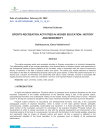
Sports-recreation activities in higher education: history and modernity
Статья научная
The article examines sports and recreation activities in Russian universities in a historical retrospective. The deteriorating health of the younger generation, poor physical fitness of students require new approaches to the professional training of future teachers at the university, which is associated with the need to improve the literacy of teachers in the field of physical culture and sports. The article pays special attention to historical innovations in the field of understanding physical culture and sports activity, in which the creative interaction of a teacher and a student, the formation of a personality with values, needs, interests, motives is associated with regular physical exercises, which are considered a common and important feature of physical education.
Бесплатно

Tasks of russian naval intelligence in China in the early XX century
Статья научная
The article examines the activities of Russian naval intelligence in China in the early twentieth century. After the defeat in the Sino-Japanese War of 1894-1895, the Chinese government began in the early twentieth century to implement a program of reviving the navy. The Japanese provide effective support to the Chinese Naval Department in the construction of warships. However, attempts to create a combat-ready Chinese fleet were prevented by the nationwide crisis that unfolded in the country. I must say that China has not been able to claim the role of not only a world, but also a regional naval power. Despite the well-founded fears of the Russian Maritime Ministry, there were no military clashes with China in the early twentieth century on the seas and rivers. At the same time, Russian naval intelligence constantly collected information about the creation of the Chinese fleet and the internal situation in the neighboring state It should be noted that the Russian Naval Ministry in the early twentieth century followed the attempts to create a Chinese fleet, but did not perceive China as the main threat at sea to the foreign policy interests of the Russian Empire.
Бесплатно
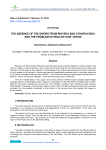
The Absence of the Sword from Rigveda and Atharvaveda and the Problem of Indo-Aryans Origin
Статья научная
Rigveda and Atharvaveda Shaunaka Samhitas have been carefully analyzed to check whether they mention copper or bronze swords. It has turned out that both texts do not know swords (only knives) and therefore must be dated in their habitats in the Northwest of the Indian subcontinent prior to the introduction of such weapons into the region. Swords have been archaeologically evidenced both in the Indus valley and in the YamunaGanges Doab only after 2000 BC. This confirms the dating of Atharvaveda Shaunaka prior to 2000 BC, and of more archaic Rigveda a few centuries earlier (prior to 2600 BC).Then all available data on the copper and bronze swords of different types (straight double-edged, machetecleaver, sickle-shaped, rapier, harpoon) originating from the Old World and dating back to 3500 2000 BC have been collected and scrutinized. Thus Cyclades, Anatolia, Syria, Palestine/ Israel/ Canaan, North-Western Caucasus, Transcaucasia, Akkad, Sumer, Elam and BactriaMargiana territories have been excluded from the possible homelands of Indo-Aryans in the periods when they already had copper or bronze swords.
Бесплатно
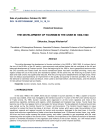
The Development of Tourism in the USSR in 1960-1990
Статья научная
The article discusses the development of tourism activities in the USSR in 1960-1990. It is shown that at the turn of the 80-90-s of the XX century, socio-economic and political factors did not contribute to the full and balanced development of Russian tourism. Since the beginning of the 1990s, due to geopolitical tensions within the CIS countries and Russia itself, the tourist recreational space has been invariably shrinking, many vast regions simply fell out of the tourist and recreational sphere. At the same time, the financing of tourism by the state and trade unions was significantly reduced. And the surviving tourist establishments set high prices, which was not always accompanied by an improvement in the quality and quantity of services provided. As a result, the demand for domestic travel and leisure, which used to dominate before, declined sharply, and the demand for trips abroad increased just as sharply.
Бесплатно

The Development of the Capitalistic Relationships in Russia in the Beginning of the XX-th Century
Статья научная
This article examines the problems of capitalist relations in the Russian economy, the influence of capital on state structures, and the development of capitalism in Russia at the beginning of the 20th century. The problem of the development of capitalism in Russia is viewed from the standpoint of the concept of a revolutionary period. Concrete revolutions should be viewed as a manifestation of the processes of stagnation of the Russian economy.Despite the noticeable development of certain heavy industries and the intensive construction of railways, Russia was inferior to some Western countries in terms of qualitative indicators of economic growth. In Russia, capitalism did not exist in the form of a system, but as a structure that did not have the potential for development. This must be taken into account when assessing the current state of the "capitalist" system in Russia and the prospects for its further development.
Бесплатно
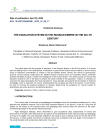
The Education System in the Russian Empire in the XIX-th Century
Статья научная
The article deals with the process of education in the Russian Empire in the XIX-th century. It is shown that the leading trend in the development of education in post-Soviet Russia was the desire to revive various forms of education characteristic of society in the pre-October period, namely, the revival of gymnasiums, lyceums, various schools, cadet corps, etc. Modern Russia is trying to focus on humanistic values, movement towards the ideals of justice, morality and intelligence of the human person. The article focuses on the fact that education should be one of the ways to awaken the social mobility of the population. Today it is necessary to overcome the false stereotypes that have prevailed for many decades and expand the boundaries of historical knowledge, which is important not only for understanding the true place and role of the country in world history, but also for solving the practical problems of renewal, determining the prospects for moving forward to qualitatively new social economic and political decisions.
Бесплатно

The Emergence of the Syrian Crisis and the Impact of the External Forces on It
Статья научная
The article analyzes the causes and historical stages of the political crisis in Syria, which lasted 8 years. Although displacement in many Western countries is seen as a step towards democracy in the region, the Arab Spring has caused instability in North Africa and the Middle East. These issues included religious and ethnic conflicts. This, in turn, posed a threat to political instability in the region.
Бесплатно
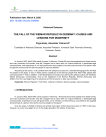
The Fall of the Weimar Republic in Germany: Causes and Lessons for Modernity
Статья научная
In January 1933, Adolf Hitler came to power in Germany. Almost 90 years have passed since those events, and many historians still wonder: how did it happen that a nation with rich cultural traditions, a developed legal consciousness, and experience of civil self-government succumbed to the calls and promises of the person who brought the country and the German people to national disaster? According to the author, in all societies there will always be a place for a talented demagogue who will lead his people to the abyss. It was on these painful complexes of the German people that Adolf Hitler played after coming to power in 1933. In addition, a well-developed civil society and a democratic political culture are needed to defend democracy. Unfortunately, none of this happened in the Weimar Republic. Weimar democracy was stillborn from the very beginning of its existence and its fall sooner or later was inevitable.
Бесплатно
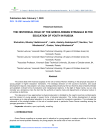
The Historical Role of the Greco-Roman Struggle in the Education of Youth in Russia
Статья научная
The article deals with historical aspects of the role of Greco-Roman wrestling in the physical education of young people in higher education institutions. The strategic direction of the countrys economic and social development requires new people in all areas, distinguished primarily by the fact that they lead a healthy lifestyle and establish civilized forms of production and interpersonal relations. In the light of these trends, we can only consider as a temporary crisis the fact that the authority of sports clubs and departments of physical culture in universities is declining. The relevance of new approaches to physical education is dictated by the need to promote combat sports and the interest of young people in power forms of physical education. The further development of society encourages us to raise physical education to a new level, to reveal its humanistic orientation. This indicates the relevance of the studied problem of the role of combat sports in particular Greco-Roman wrestling among the younger generation in Russia.
Бесплатно
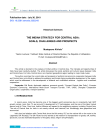
The Indian Strategy for Central Asia: Goals, Challenges and Prospects
Статья научная
This article is devoted to the analysis of Indian politics in Central Asia. The interests and opportunities of India have been carefully studied. The article discusses the social, political and cultural issues between India and Central Asia. For India, Central Asia is an important geopolitical region leading to major trade routes. The author examines the current state and prospects of political and economic cooperation between India and Central Asia, joint efforts to address the problems and threats facing sustainable development of the region, which must be addressed in the development of bilateral and multilateral relations - logistics and investment cooperation.
Бесплатно
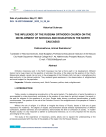
Статья научная
Orthodox missionary work in the North Caucasus has had a thorny path in its development. Different factors had a huge impact on the specifics of activities: the policy of the state and the position of the Church. Missionaries played a great role not only in the propaganda of the Orthodox faith, but also in strengthening the state authority in the national outskirts. They rendered great assistance in the dissemination of enlightenment and social support for the population.
Бесплатно
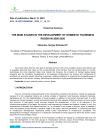
The Main Stages in the Development of Domestic Tourism in Russia in 2000-2020
Статья научная
The article shows that the main goal of domestic tourism is the most complete, rational and efficient use of available resources that make up the overall potential of the territory that has attractiveness for tourists. Accordingly, the most important tasks here include the following: the formation of rational spatial design programs with the mandatory development of all necessary infrastructure; the creation and maintenance of conditions for economic growth; attracting investment; creating conditions for improving the competitiveness of business entities in the tourism industry, stimulating the attraction of highly qualified personnel to the industry.
Бесплатно
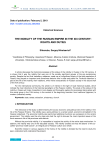
The Nobility of the Russian Empire in the XIX Century: Rights and Duties
Статья научная
In article discusses the historical processes of the status of the nobility in Russia in the XIX century. It is shown that it was the nobility that was one of the socially significant groups of the pre-revolutionary society. Despite the fact that hereditary noblemen made up an insignificant share of the total population of Russia, they played an important and sometimes decisive role in state and public life. Particular attention is paid to the life of the nobility, their traditions, which were characteristic of Russian society in the second half of the XIX century.For the international community, the article is of interest in the light of local historical studies, which indicate the main directions of the historical paradigms of the Russian nobility. The study of the status of the nobility in Russia will make it possible to more deeply and thoroughly explore the processes taking place with this social group in the 19th century in the context of the beginning transition from traditional (agrarian) to modern (industrial) society.
Бесплатно
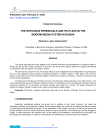
The Orthodox Periodicals and Its Place in the Modern Media System in Russia
Статья научная
This article discusses the main stages of the historical formation and development of religious media in Russia, as well as their modern existence. In this work, we clarify some specific features of religious periodicals in comparison with the secular print press in Russia. The fact that the church has its own media makes it more independent and independent in expressing its point of view regarding various social and political problems in modern society. It also allows the church to pursue its own policy in the most important sphere of national and religious relations, in relation to certain groups of the countrys population. The discourse of the Russian Orthodox Church in the domestic media originated in the XIXth century. The current topical discourse of the Russian Orthodox Church in contemporary print and electronic Russian media is extremely important for the mentality of Russian citizens and society as a whole. This paper considers the system of Russian Orthodox media, which is part of the Russian media system.
Бесплатно
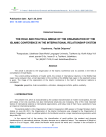
Статья научная
The article is devoted to the Organization of the Islamic Conference and its activities in the field of consolidation of Arab States.The current political problems of Arabic world, the context of international relations in the Middle East region were analyzed. Also, a brief description of the conflicts of the Middle East region in the twentieth century is given. The image of the organization of the Islamic conference in the field of international relations is considered.
Бесплатно
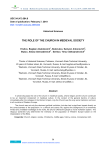
The Role of the Church in Medieval Society
Статья научная
In article discusses the role of the church in medieval society, where religion and the church continued to be an important component of medieval culture. In the context of the general decline of culture immediately after the collapse of the Roman Empire, only the Church was the only social institution common to all countries of Western Europe.The church was not only the dominant political institution, but also had a significant impact directly on the consciousness of the population. In a difficult and scanty life, against the background of an extremely limited and unreliable knowledge of the world, the Church offered the people a moral worldview system. This religious worldview fully determined the mentality of the population of Western Europe based on the interpretation of the Bible.
Бесплатно

The Russian Church in the State Mechanism of Russia
Статья
The article outlines the key areas of the charitable and educational activities of the Orthodox Church, which are analyzed during religious reforms in the 19th and early 20th centuries. in Russia. It is shown that at that time the scale of charity aid and the responsibilities of charitable organizations increased; the control over the distribution of aid has improved, the role of the Church in the social protection of the population has increased. The conclusions made in the article allow us to look at a holistic picture of the Church's activities in providing the educational process in Russian church schools during the period under study. It turned out that the concrete activity of the clergy, which was impossible without the proper level of education, placed the clergy in the most literate category of the population. It is the priests, in the absence of a developed education system in Russia, began to introduce primary public education. This article helps to understand and systematize the position of the Church as a spiritual and moral institution that preserves Russia's cultural heritage. Of particular importance is the regional nature of the topic under study, which makes it possible to understand the general and specific relations between the Church and the state. For the international community, the article will be useful as an archival exhibition, which is a rare publication that reveals the relationship between the Orthodox Church and the state in Russia in the 19th and early 20th centuries.
Бесплатно
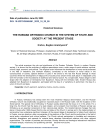
The Russian Orthodox Church in the System of State and Society at the Present Stage
Статья научная
The article examines the role and significance of the Russian Orthodox Church in modern Russian society. It is shown that the activities of religious associations cover a wide range of social relations: spiritual, cultural, legal, economic and political. The religious factor influences the development of many social processes in the field of interethnic and interfaith relations, contributes to the formation of moral values in the consciousness of society. Special attention is paid in the article to the fact that Russia belongs to those countries where the development of religious life of society since ancient times took place in inseparable unity with the formation of the foundations of statehood and national culture. As a single state, Russia began to take shape after the adoption of Christianity from Byzantium. Along with the Orthodox faith, Ancient Russia also adopted from Byzantium its legislation, permeated with the idea of a "symphony of authorities", the idea of a union of Church and state.
Бесплатно
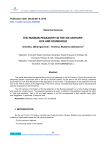
The Russian Peasantry in the XIX century: Life and Household
Статья научная
The article discusses the peculiarities of the life of peasants in the XIX century. During this period, the peasantry played a significant role in the life of Russian society. At the end of the XIX century, peasants accounted for more than 85 percent of the population of the Empire. The population of the peasants from the end of the XVII-th century to the beginning of the XX-th century increased significantly due to natural growth and the acquisition of new territories.The XIX century in the history of the development of the Russian peasantry is a time of great changes and hopes for a bright future. The peasants ceased to be serfs. In addition, the peasants received the rights of "free rural residents", that is, full civil legal capacity in all that corresponded to their specific class rights and obligations, in particular, to acquire land.
Бесплатно
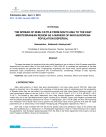
Статья научная
The paper develops the hypothesis that zebu cattle (depictions) are a marker of Indo-European population dispersal from the Indus Valley to Syria and Anatolia in 70001000 BC. It combines the exploration of the data on human genetics (full genomes and Y-Haplogroups originating from South Asia), bovine genetic admixture distribution maps (mitochondrial, autosomal and Y-chromosomal), archaeology (findings of zebu figurines, pictures, images and seals) and Indo-European linguistics.
Бесплатно

